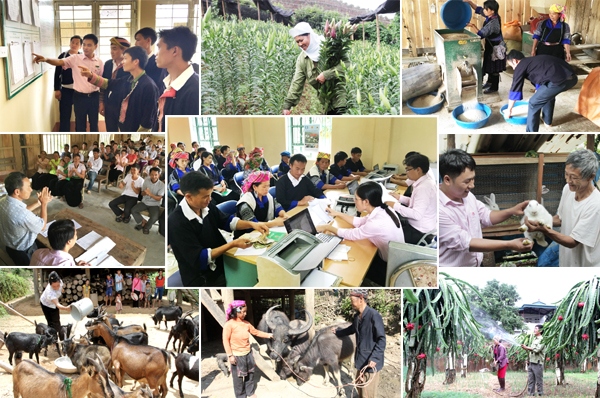Vietnam promotes population policies alongside fundamental human rights
VOV.VN - Population and family planning work has significantly contributed to the country's socio-economic development, while all population policies ensure that fundamental human rights are at the centre.

In celebration of World Population Day on July 11, the nation has chosen the theme of "Investing in population work is investing in sustainable development".
In 2023, the Vietnamese population exceeded the 100 million mark with the country ranking 15th in the world with more than 100 million citizens.
Under the target until 2030, the number of young men and women receiving health advice and examination before marriage will reach 90%; the number of child marriage couples and the number of consanguineous marriage couples will be reduced by 50% and 60%, respectively; 70% of pregnant women will be screened for at least the four most common congenital diseases and defects; and 90% of newborns will be screened for at least the five most common congenital diseases.
The average life expectancy of Vietnamese people is expected to reach 75 years under the plan. In addition, 100% of the elderly will have health insurance cards with health management, medical examination, and treatment; whilst being able to receive care at home, in the community, or at centralised care facilities.
By 2030, the height of an 18-year-old man will reach 168.5cm, whilst women will be at 157.5cm. The Human Development Index (HDI) is among the top four countries in Southeast Asia.
The goal of the Vietnam Health Program signed by the government in 2018 is to build a supportive environment and strengthen the capacity of each person; competently perform the management and comprehensive health care to improve the health, longevity, and quality of life of Vietnamese people.
During the 2018 to 2030 period, the Vietnam Health Program focuses on 11 areas divided into the three groups of health improvement, health protection and disease prevention, along with primary health care and disease control.
In fact, Vietnamese population policies have so far achieved encouraging results.
According to the results of Vietnam's population censuses from 1989 to the present, the average life expectancy of Vietnamese people has continuously increased, rising from 65.2 to 73.7 by late 2023.
In terms of people's life expectancy, the nation ranks fourth in Southeast Asia with a life expectancy of 66, the lowest in the region, whilst the world average stands at 73.4 years.
The height of Vietnamese people has also seen a remarkable improvement. Results of the 2017 to 2020 National Nutrition Census indicates that the average 18-year-old male youth in 2020 reached a height of 168.1cm, an increase of 3.7cm compared to 2010 in 164.4cm. Female youth in 2020 reached an average height of 156.2cm, while the figure was only 154.8cm back in 2010.
Vietnam has greatly improved population quality as human rights policies have been carried out in a humane and practical way, such as prioritising support for low-income people, ethnic minority people, women, the elderly, and children.
The Vietnamese Party and State have adopted numerous specific policies in a bid to improve the lives of the elderly and people based in ethnic minority areas.
In July, the Government issued a decree on increasing the level of social benefits for the elderly from July 1, with the highest level up to VND1,500,000.
The Committee for Ethnic Minorities said that at present, the country has 188 policies specifically for ethnic minority and mountainous areas, including the Sedentary Cultivation Program, Programs 134 and 135, as well as schemes under Resolution 30a.
In 2023, the number of poor households among ethnic minorities stood at about 17.82%, down 3.2% compared to 2022.
The Party and State's poverty reduction policies and plans have been well implemented, thus gradually improving the lives of poor households.
Poor households nationwide were at 9.88% in 2015, whilst by 2023 the number according to the multi-dimensional poverty standard had dropped to only 2.93%. As a result, the country has become one of the world's models for achievements in hunger eradication and poverty reduction.
The UN Development Program (UNDP) Representative Office in Vietnam assesses that the nation is among the top group among countries globally with the fastest progress in realising sustainable development goals and is one of the states to boast the best progress in terms of implementing global goals in Asia.
Thus, in recent years, the country has applied human rights protection in a practical way, putting basic human rights at the centre of population policies.


